
Bruce Bower has written about the behavioral sciences since 1984. He often writes about psychology, anthropology, archaeology and mental health issues. Bruce has a master's degree in psychology from Pepperdine University and a master's degree in journalism from the University of Missouri. Following an internship at Science News in 1981, he worked as a reporter at Psychiatric News, a publication of the American Psychiatric Association, until joining Science News as a staff writer. In 1996, the American Psychological Association appointed Bruce a Science Writer Fellow, with a grant to visit psychological scientists of his own choosing. Early stints as an aide in a day school for children and teenagers with severe psychological problems and as a counselor in a drug diversion center provided Bruce with a surprisingly good background for a career in science journalism.

Trustworthy journalism comes at a price.
Scientists and journalists share a core belief in questioning, observing and verifying to reach the truth. Science News reports on crucial research and discovery across science disciplines. We need your financial support to make it happen – every contribution makes a difference.
All Stories by Bruce Bower
-
 Psychology
PsychologyPsychology has struggled for a century to make sense of the mind
Research into what makes us tick has been messy and contentious, but has led to intriguing insights.
-
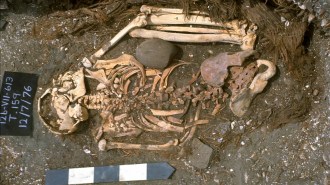 Anthropology
AnthropologyA skeleton from Peru vies for the title of oldest known shark attack victim
The 6,000-year-old remains of a teen with a missing leg and tell-tale bite marks came to light after news of a 3,000-year-old victim in Japan surfaced.
-
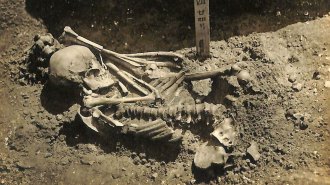 Anthropology
AnthropologyA partial skeleton reveals the world’s oldest known shark attack
An ancient shark bite victim died quickly, before his body was recovered and buried, a new study finds.
-
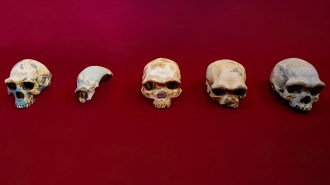 Anthropology
Anthropology‘Dragon Man’ skull may help oust Neandertals as our closest ancient relative
A Chinese fossil has been classified as a new Homo species that lived more than 146,000 years ago, but not all scientists are convinced.
-
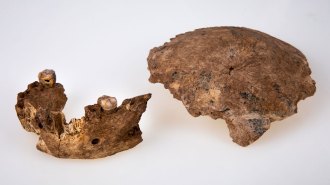 Anthropology
AnthropologyIsraeli fossil finds reveal a new hominid group, Nesher Ramla Homo
Discoveries reveal a new Stone Age population that had close ties to Homo sapiens at least 120,000 years ago, complicating the human family tree.
-
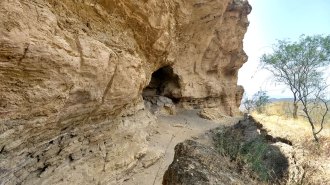 Archaeology
ArchaeologyNew clues suggest people reached the Americas around 30,000 years ago
Ancient rabbit bones from a Mexican rock-shelter point to humans arriving on the continent as much as 10,000 years earlier than often assumed.
-
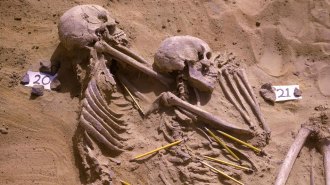 Anthropology
AnthropologyHunter-gatherers first launched violent raids at least 13,400 years ago
Skeletons from an ancient African cemetery bear the oldest known signs of small-scale warfare.
-
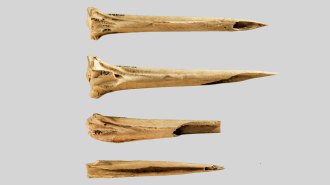 Archaeology
ArchaeologyThe oldest known tattoo tools were found at an ancient Tennessee site
Sharpened turkey leg bones may have served as tattoo needles between 5,520 and 3,620 years ago, at least a millennium earlier than previously thought.
-
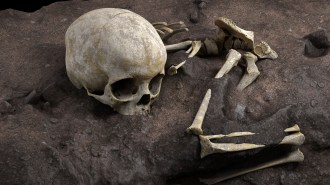 Anthropology
AnthropologyA child’s 78,000-year-old grave marks Africa’s oldest known human burial
Cave excavation of a youngster’s grave pushes back the date of the first human burial identified in the continent by at least a few thousand years.
-
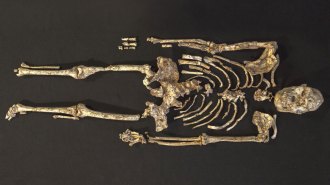 Anthropology
AnthropologyLittle Foot’s shoulders hint at how a human-chimp common ancestor climbed
The shape of the 3.67-million-year-old hominid’s shoulder blades suggests it had a gorilla-like ability to climb trees.
-
 Anthropology
AnthropologyA coronavirus epidemic may have hit East Asia about 25,000 years ago
An ancient viral outbreak may have left a genetic mark in East Asians that possibly influences their responses to the virus that causes COVID-19.
-
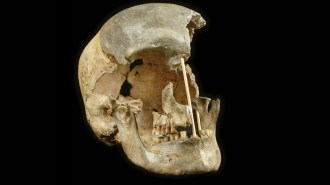 Genetics
GeneticsEurope’s oldest known humans mated with Neandertals surprisingly often
DNA from ancient fossils suggests interbreeding regularly occurred between the two species by about 45,000 years ago, two studies find.